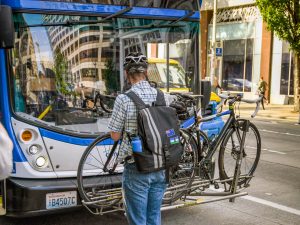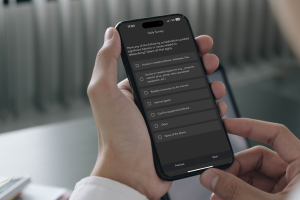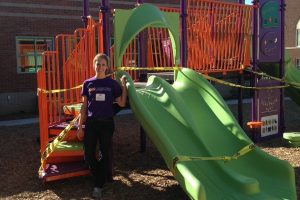Survey-based research is foundational to RSG’s data collection work. Through surveys, we help our clients gather real-world insights into populations of interest. Using rMove™, we deploy these surveys at scale, collecting valuable data to inform planning and forecasting work.
Supporting the techniques and technologies in our data collection toolkit are our skilled market researchers, including Abigail Rosenson, whose clients and colleagues know her as Abby. Abby earned her MBA from Rollins College after completing her bachelor's degree in classical studies. After graduating, she developed and analyzed operational data models as part of her role as a business process lead for a small consulting company before joining RSG in 2016.
In her role as a Managing Consultant at RSG, Abby helps oversee our team’s implementation of household travel survey projects across the United States. Her dedication to excellence in client service and commitment to gathering the most accurate and relevant data possible have garnered respect and accolades from clients and peers alike. Abby’s contributions to the field are widely recognized, underscored by her active participation in the Transportation Research Board’s Standing Committee on Travel Survey Methods (AEP25).
We connected with Abby to talk about recurrent travel surveys, multimethod sampling, and the future of travel surveys.
How do recurrent travel surveys, as highlighted in our January Insights piece, differ in administration and outcomes from traditional decennial surveys?
The key differences between decennial and recurrent travel surveys center on the scope of what’s possible. With recurrent surveys, agencies can engage in more active trend analyses, which is important for understanding the nuances around travel behaviors in their region. This level of understanding is less feasible with traditional decennial surveys. Pooling recurrent data for travel model development purposes not only reduces the weight of older data in the model but also improves forecasting accuracy.
With recurrent surveys, it's possible for our clients to capture things as they're changing, rather than just seeing a before and after snapshot. For example, imagine if someone had collected data in 2015 and then again in 2025. They're not going to capture the intervening pandemic years. Or the transition to telework and its evolution. They'll just see the end state, and the data story in that case is much different.

After a six-year pilot program performed in cooperation with RSG, the Puget Sound Regional Council in Washington State chose a biennial approach to their travel surveys.
As far as survey administration and project setup go, recurrent surveys are more efficient. Instead of spending significant resources on fully rehashing the materials from 10 years ago, we can use project resources to improve survey methodology and deliver greater value to our clients. There is also more continuity in agency and consultant staff between waves, which can be advantageous for project efficiency.
Example steps to improve survey methodology can include conducting an A/B test to refine our recruitment methods for a particular region or refining processes to include recurrent updates to data cleaning based on lessons learned. In short, the real value add for our clients is that our team can focus resources on improving data collection instead of reinventing (and relearning) the same wheel every 10 years.
The trick with recurrent survey work is to be very thoughtful about innovation between waves. Because so much of their advantage lies in trend analyses, efficiencies, and pooled data, it’s important to consider how even minute changes—like slightly tweaking survey answer options—will impact downstream data uses. It’s tempting to innovate constantly when we have the resources or time, but it’s critical that we focus on the right innovations to avoid losing the value of more frequent data collection.
Following the COVID-19 pandemic, what lasting changes have been made to the way we survey populations, and how do these differ from prepandemic methods?
The disruptions caused by the COVID-19 pandemic highlighted the value of recurrent survey programs and more frequent data collection overall. Recurrent survey projects in our portfolio were the first to resume fieldwork and were the least disrupted by the pandemic because they had continuous data to draw upon. This allowed them to better track trends and forecast future developments.
In contrast, agencies that had typically fielded their survey programs once every 10 years encountered delays during this time. The necessity to wait or pause survey work meant they were often working with data that was more than 10 years old by the time they could resume data collection following the travel disruptions precipitated by the pandemic. This is not ideal for agencies trying to keep up with trends that have major impacts on travel, like teleworking and mode shifts.
Why are survey response rates declining, and what approaches does RSG suggest to account for this trend?
People are inundated with more surveys across more channels than ever before, particularly after the COVID-19 pandemic. Additionally, some research has observed across-the-board declines in people’s sense of civic duty or involvement in their communities. In past decades, people might have felt a strong desire to be a part of shaping their community, which is a core premise of the research we partner with our clients to conduct. That same civic-minded selling point doesn't always connect with people now. We see this evidenced in decreased ties to our communities and impacts on response rates for other civic duties such as jury duty. Recurrent surveys can help address this issue by spreading out our sample collection over time and pooling the data. This approach can alleviate the pressure to achieve a high sample size in a short period, giving us more time to collect data.
Having recently moderated a TRB webinar on multimethod sampling for travel surveys, could you explain its significance and your key takeaways, especially regarding its role in reaching populations of importance?
Multimethod sampling is about leveraging the best of all available options. When we send mailed invitations to households through address-based sampling (ABS), we have more confidence in the downstream data weights because we know the underlying population. However, this probability-based method isn't necessarily the best choice when trying to improve representation due to limitations in oversampling and targeting.
Complementing ABS with sources better at targeting specific populations is crucial for reaching populations of importance, which might be underrepresented or hard to reach through traditional survey methods.
A key discussion point from the April 2024 TRB webinar highlighted the challenge associated with some nonprobability methods, like panels, which are common but have their own biases. For instance, panel participants might watch more television or be early tech adopters, traits that could influence their responses but are hard to account for in the survey results because we don’t always have reliable control data to correct for biases.
The webinar highlighted the need for more research into how these biases affect survey outcomes and the importance of being open to creative sampling strategies. Factors beyond demographics and geography may exist and may require correction to ensure our surveys accurately represent the populations they study.
Given the evolution from paper to online and now to mobile surveys, how do you envision the next era of travel surveys and the technologies that might define it?
Predicting the future of travel survey methods is challenging. That said, I think the mobile era will remain relevant for the foreseeable future, but will be increasingly combined with mobility data sources, as RSG has done for the Florida Department of Transportation through our work in District 7.

rMove™ is RSG's location-aware market research app. Data collected using rMove can be combined with other mobility data sources to deliver more accurate insights to clients.
The rate at which technology evolves makes it difficult to identify exactly what these new methods will be, but I foresee the integration of various data sources playing a significant role. This approach is particularly relevant for travel surveys, where achieving representative data without influencing respondents' behavior is crucial. For example, gamifying the process could theoretically generate more data for our clients, but if not implemented thoughtfully, it risks altering the very behaviors we aim to measure, an outcome we work hard to avoid.
Future methods of data collection will largely depend on widespread technological adoption, bridging different demographics and behaviors. Given the current situation with declining survey response rates, solely relying on traditional methods won't suffice in many cases. We'll continue to complement these methods with additional data sources to maintain the quality and representativeness of our datasets. This evolution aligns with RSG’s work on mobility data analytics, supporting an industry shift toward integrating diverse data sources while continuing to adapt to new technological advancements.
Do you see a role for using generative AI in travel surveys? What would that look like?
Generative AI can significantly enhance travel surveys, particularly by addressing issues where respondents don't always answer surveys as we intend. Despite our best efforts to make instructions clear and intuitive—explaining how we define a trip, what we consider the primary mode or purpose—misunderstandings and misreporting do occur. Using AI can help us correctly classify respondents’ responses, delivering greater value to our clients. For example, rather than choosing from a dropdown list when completing a survey in rMove™, respondents type in their activities, and AI can then accurately code these responses.
Furthermore, AI can play a crucial role in data cleaning, a concept similar to classifying survey responses but applied post-collection. We're beginning to experiment with using organizationally secure forms of generative AI to code open-ended text responses, showcasing its immediate applicability and potential for broader use. Generative AI holds promise for making survey data collection and processing more accurate and efficient, creating a clear role for its integration into future travel survey methodologies.
As chair of RSG’s Stewardship Committee and a former KABOOM! volunteer, how important is giving back to you, and which volunteer activities bring you the most joy, especially considering April is also National Volunteer Month?
Giving back to my community and making connections with people that I might not otherwise meet brings me a lot of joy. Working with KABOOM! was great because it allowed me to travel and meet individuals from completely different backgrounds. It was incredibly rewarding to learn about their daily motivations and discover shared interests.

Prior to joining RSG, Abby volunteered with KABOOM!, which works to end playspace inequities.
While I'm not traveling for volunteer work anymore, I still enjoy engaging in local volunteer activities. Participating in events like Habitat for Humanity volunteer days or making meals at the Ronald McDonald House are ways I find to contribute. These activities not only help lift some burden off others but also allow me to connect and contribute in meaningful ways.
As for volunteering at RSG, I’m planning to join my colleagues in our Washington, DC, office to use a few of our paid volunteer hours at the end of the month to pack snack bags for an affordable housing organization in the metro DC area.
What are you most looking forward to in the field of travel surveys? What technology, development, or new way of thinking has captured your attention or imagination and why?
I'm particularly excited about the push toward creating standards for travel survey data and how it should be used, including tools that facilitate interaction with this data. This advancement will enable more cross-agency collaboration, an area RSG has already been a leader in through our work with the ActivitySim consortium. We work with various agencies that have different needs and levels of technical experience, and it's exciting to see the shared enthusiasm for supporting each other in this field.
Another development that excites me is the increased effort to make data accessible to people without technical expertise, using tools or visualizations. This approach, which includes building intuitive dashboards, represents a shift toward democratizing data, making it easier for a wider audience to engage with travel survey information. This not only improves the quality and cleanliness of the data but also broadens the base of people who can interact with and benefit from this information. These advancements represent a significant leap forward in how we collect, process, and share data, promising to bring about more inclusive and comprehensive insights into travel behaviors.
·····························
Abby Rosenson is an experienced project manager who helps oversee the successful execution of RSG’s market research projects. She has managed household- and person-level travel surveys in the United States, Canada, and Australia. Abby works closely with RSG’s clients to devise innovative survey approaches and methodologies that deliver the highest-quality data with minimal respondent burden. She is an active member of the Transportation Research Board’s Standing Committee on Travel Survey Methods (AEP25).



